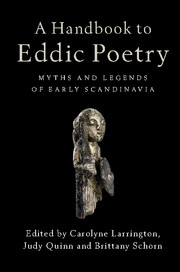Book contents
- Frontmatter
- Contents
- List of illustrations
- List of contributors
- Translations and abbreviations of the titles of eddic poems
- Introduction
- 1 The transmission and preservation of eddic poetry
- 2 Traditions of eddic scholarship
- 3 The editing of eddic poetry
- 4 The dating of eddic poetry
- 5 Eddic performance and eddic audiences
- 6 Eddic poetry and mythology
- 7 Eddic poetry and the religion of pre-Christian Scandinavia
- 8 Eddic poetry and heroic legend
- 9 Place names in eddic poetry
- 10 Eddic poetry and the imagery of stone monuments
- 11 Eddic poetry and archaeology
- 12 Eddic modes and genres
- 13 Eddic metres
- 14 Eddic style
- 15 Kennings and other forms of figurative language in eddic poetry
- 16 Alliterative lexical collocations in eddic poetry
- 17 The representation of gender in eddic poetry
- 18 The reception of eddic poetry
- Consolidated bibliography
- Index
13 - Eddic metres
Published online by Cambridge University Press: 05 August 2016
- Frontmatter
- Contents
- List of illustrations
- List of contributors
- Translations and abbreviations of the titles of eddic poems
- Introduction
- 1 The transmission and preservation of eddic poetry
- 2 Traditions of eddic scholarship
- 3 The editing of eddic poetry
- 4 The dating of eddic poetry
- 5 Eddic performance and eddic audiences
- 6 Eddic poetry and mythology
- 7 Eddic poetry and the religion of pre-Christian Scandinavia
- 8 Eddic poetry and heroic legend
- 9 Place names in eddic poetry
- 10 Eddic poetry and the imagery of stone monuments
- 11 Eddic poetry and archaeology
- 12 Eddic modes and genres
- 13 Eddic metres
- 14 Eddic style
- 15 Kennings and other forms of figurative language in eddic poetry
- 16 Alliterative lexical collocations in eddic poetry
- 17 The representation of gender in eddic poetry
- 18 The reception of eddic poetry
- Consolidated bibliography
- Index
Summary
Definitions and metrical properties
The corpus of eddic poetry is most readily defined on the basis of poetic metre: poems composed in the metres employed in the Codex Regius may be classified as eddic, setting them apart from poems in skaldic metres and rímur. This means that in addition to the poems in the Codex Regius, a number of other compositions must be regarded as eddic, including Rígsþula, Grottasǫngr, and fragments of other poems preserved in Snorra Edda, as well as Baldrs draumar, Hyndluljóð, and poetic material contained in various fornaldarsögur. The three poems Haraldskvæði, Eiríksmál, and Hákonarmál are quasi-exceptions: although they are composed in eddic metres, they are panegyrics (and thus, in that respect, skaldic), and, unlike all other eddic poems, two of them are attributed to known poets (another skaldic trait). Accordingly, they are usually classified with the skaldic corpus, though in acknowledgement of their liminal status they are commonly referred to as ‘the eddic praise-poems’.
Three metres are employed in eddic poetry, termed (on the basis of sometimes conflicting medieval sources) fornyrðislag (‘old story metre’), ljóðaháttr (‘song metre’), and málaháttr (‘speech metre’). Whereas metres in the modern Germanic languages are isochronous – that is, their patterns are of stressed syllables at regular intervals, producing a rhythmic beat – eddic metres, like all early Germanic alliterative metres, depend upon alliteration and deploy stresses in a fashion that sounds irregular to modern ears, but which is nonetheless highly structured on the basis of a variety of linguistic properties besides stress, as analysed by Eduard Sievers (1893). The most important of these other properties is syllable weight, as counted in morae. A mora is a phonological unit of length equivalent to a short vowel or a simple consonant; diphthongs and long vowels thus comprise two morae. A syllable includes an onset (zero or more consonants preceding the vowel or diphthong contained in the syllable), a peak (the vowel or diphthong at the heart of the syllable), and a coda (zero or more consonants following the peak). For the purpose of metre (and metre alone), it may be said that a syllable is heavy if three or more morae appear between the onset and the beginning of the next peak.
- Type
- Chapter
- Information
- A Handbook to Eddic PoetryMyths and Legends of Early Scandinavia, pp. 252 - 270Publisher: Cambridge University PressPrint publication year: 2016
- 5
- Cited by

